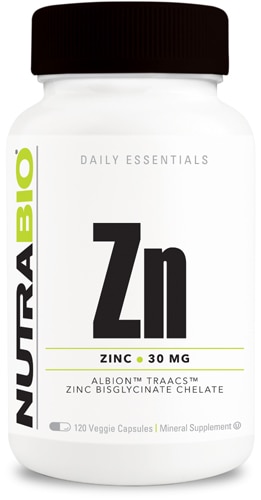[vc_row css=".vc_custom_1759844233392{background-color: #efefef !important;}"][vc_column][vc_column_text css=""]
Summary: Chelated minerals are bound to amino acids, making them easier for the body to absorb and gentler on digestion. They’re also more stable and less likely to cause stomach upset or interfere with other nutrients. Studies show chelated forms—like calcium bisglycinate—can be absorbed nearly twice as well as non-chelated versions. For the best quality and effectiveness, look for verified chelates such as TRAACS® on supplement labels.[/vc_column_text][vc_separator color="black" css=""][/vc_column][/vc_row][vc_row][vc_column][vc_column_text]If you’ve ever hesitated to take zinc, iron or other mineral supplements due to worries about them upsetting your stomach or uncertainty about whether they’re even absorbed, you should consider
chelated minerals.
The way that mineral supplements are formulated can influence how well your body utilizes and tolerates them. Over the past few decades, chelated minerals have risen to the top of preferred forms of mineral supplements.

What does chelated mean?
Chelate (pronounced “KEY-late”) comes from the Greek word “chele,” which means “claw.” Chelation refers to the claw-like way in which a mineral is bound to an organic molecule, such as an amino acid, forming a protective shell around the mineral. In this case, “organic” means a molecule that contains carbon, rather than referring to foods grown without pesticides.
“Minerals in living nature are packaged in proteins, which increases their bioavailability,” says Dustie Butteiger, a nutrition science manager at
Balchem Human Nutrition & Health, a leading manufacturer of chelated minerals used in several brands of dietary supplements.
When making mineral supplements,
amino acids (the building blocks of protein) can be used as natural chelators. Chelating agents are also called ligands.
Glycine is the smallest amino acid, which makes it an ideal chelating agent. Because it is small, it is easily absorbed through the intestinal wall. It also forms stable bonds with minerals and doesn’t release them prematurely. Examples of minerals chelated with glycine are zinc glycinate and magnesium bisglycinate.
In contrast, many of the minerals used in supplements today are inorganic forms, such as oxides, carbonates and sulfates, Butteiger says. These non-chelated minerals are considered “inorganic” because they’re not attached to a carbon-containing molecule. They have names like magnesium oxide, calcium carbonate and ferrous (iron) sulfate.
Are chelates good or bad?
“Mineral amino acid chelates have been scientifically proven in multiple clinical trials to be more easily absorbed and more available to meet the body’s needs,” Butteiger says.
For example, one
human study found that 23% of calcium from a calcium carbonate supplement (non-chelated) was absorbed while 44% of calcium from calcium bisglycinate (chelated) was absorbed when taken away from food. That means your body gets more
calcium to support bone health, proper nerve messaging and muscle function from the chelated calcium.
At the same time, it’s important to note that you still get some benefit from non-chelated mineral supplements. Moreover, taking non-chelated mineral supplements with food may improve their absorption. For example, in the above human study, the absorption of calcium carbonate
increased by 6% when taken with a meal.
Why is chelated better?
Non-chelated minerals more readily break down into charged particles (ions), which makes them
more reactive with other compounds. That can decrease your absorption of the minerals and increases the chances of them interfering with the absorption of other nutrients.
Chelated minerals have a neutral charge. This can help prevent them from
attaching to other compounds, such as phytate in grains or oxalate in spinach, that can interfere with your absorption of the minerals.
Chelation also promotes the stability of minerals in multivitamin-mineral supplements, which deters them from interacting with and degrading vitamins. In one
study, a dietary supplement containing non-chelated minerals lost 40% of its vitamin C during six months of proper storage. In contrast, a supplement containing chelated minerals had no significant loss of vitamin C during the storage period.
Are chelated minerals well-tolerated?
Because chelated minerals stay bound to their ligand as they pass through the stomach, they tend to be gentler on the gut and less likely to cause stomach upset and other issues, Butteiger says.
For example, non-chelated
iron or
zinc supplements may cause nausea or other gastrointestinal upset, especially if you take them on an empty stomach. And
magnesium oxide may trigger diarrhea.
In one
classic double-blind study, scientists tested the tolerability of a ferrous (iron) sulfate supplement versus ferrous bisglycinate in 38 healthy women. About 37% of the women experienced moderate-to-severe side effects only while taking the ferrous sulfate (non-chelated) form of the iron supplement. When taking the bisglycinate (chelated) form, they were more likely to avoid side effects like bloating, constipation and nausea.
Chelated mineral supplements, such as
zinc bisglycinate, have also been shown to be better tolerated in children.
What do supplement?
“Properly formed mineral amino acid chelates mimic what living nature does in protecting the mineral,” Butteiger says. “But not all chelates are equal to each other. It is entirely dependent on the ligand and the chemical conditions under which it was reacted.”
Chelation requires
highly sophisticated technology and should be done in a tightly controlled environment. After the process, the manufacturer should test to ensure that true chelate bonds were formed.
Some chelated mineral supplements include the
TRAACS designation on the label, which stands for The Real Amino Acid Chelate System. This is a patented method for testing and validating that successful chelation with amino acids has occurred.
Most minerals are available in chelated forms, including calcium, chromium, copper, iron, magnesium, selenium and zinc. Still, you shouldn’t necessarily look for all minerals in a supplement to be chelated.
“There are certain minerals, such as phosphorus, that cannot be chelated because they do not have the chemical properties to allow ligands such as amino acids to bind with them to form a claw structure,” Butteiger says.
In short, if you’re concerned about absorption and tolerance of
mineral supplements, opt for chelated versions, when available. Still, if you already have non-chelated mineral supplements on hand or they fit your budget better, you generally can support their absorption and/or your tolerance of them by taking them with a meal.
[/vc_column_text][vc_separator][vc_text_separator title="Frequently Asked Questions" css=""][vc_separator css=""][/vc_column][/vc_row][vc_row][vc_column][vc_toggle title="What are chelated minerals?" css=""]Chelated minerals are minerals that have been bonded to amino acids or other organic molecules. This “claw-like” structure helps improve absorption and makes them easier on the stomach.[/vc_toggle][vc_toggle title="Why are chelated minerals better absorbed?" css=""]The amino acid bond helps protect minerals as they pass through the digestive system, allowing more to be absorbed into the bloodstream compared to non-chelated forms like oxides or carbonates.[/vc_toggle][vc_toggle title="Are chelated minerals gentler on the stomach?" css=""]Yes. Because they remain bound during digestion, chelated minerals are less likely to cause nausea, bloating or constipation—common issues with non-chelated supplements like iron sulfate or magnesium oxide.[/vc_toggle][vc_toggle title="Do I still get benefits from non-chelated minerals?" css=""]Absolutely. Non-chelated minerals still support your nutrient needs—especially when taken with food, which can improve absorption.[/vc_toggle][vc_toggle title="How can I tell if a supplement contains chelated minerals?" css=""]Look for names that end in “-glycinate,” “-bisglycinate,” or “-chelate” (such as zinc bisglycinate). You can also check for the
TRAACS® designation, which confirms true amino acid chelation.[/vc_toggle][vc_toggle title="Are all minerals available in chelated form?" css=""]Most are, including calcium, magnesium, zinc, iron and selenium. However, some—like phosphorus—can’t be chelated due to their chemical properties.[/vc_toggle][vc_toggle title="Should I always choose chelated minerals?" css=""]If you experience stomach discomfort or have absorption issues, chelated minerals may be the better choice. But for most people, a balanced diet and a high-quality supplement—chelated or not—will meet daily needs.[/vc_toggle][/vc_column][/vc_row][vc_row][vc_column][vc_separator css=""][vc_text_separator title="Featured Products" border_width="2"][vc_row_inner equal_height="yes" content_placement="middle" gap="35"][vc_column_inner width="1/3"][vc_single_image image="188729" img_size="full" alignment="center" onclick="custom_link" img_link_target="_blank" css=".vc_custom_1759844007610{padding-right: 7% !important;padding-left: 7% !important;}" link="https://www.vitacost.com/solgar-chelated-magnesium-400-mg-250-tablets"][/vc_column_inner][vc_column_inner width="1/3"][vc_single_image image="188728" img_size="full" alignment="center" onclick="custom_link" img_link_target="_blank" css=".vc_custom_1759844032170{padding-right: 7% !important;padding-left: 7% !important;}" link="https://www.vitacost.com/carlson-chelated-magnesium"][/vc_column_inner][vc_column_inner width="1/3"][vc_single_image image="188727" img_size="full" alignment="center" onclick="custom_link" img_link_target="_blank" css=".vc_custom_1759844057670{padding-right: 7% !important;padding-left: 7% !important;}" link="https://www.vitacost.com/bluebonnet-nutrition-buffered-chelated-magnesium-200-mg-60-vegetable-capsules"][/vc_column_inner][/vc_row_inner][/vc_column][/vc_row]




